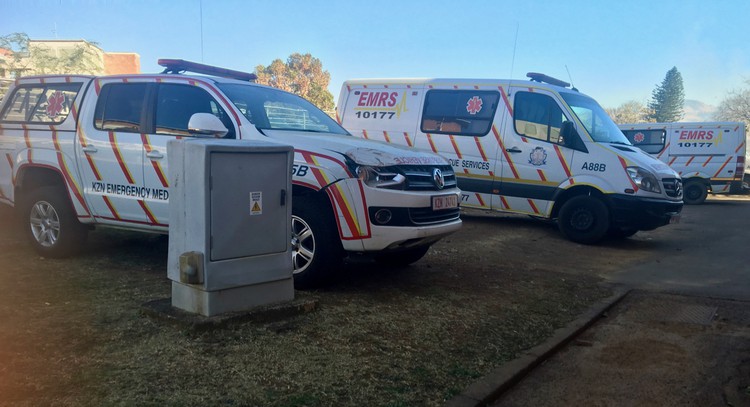
Ambulances and emergency vehicles parked at Edendale Hospital look good, but hardly any are operational. Photo: Nompendulo Ngubane
3 July 2019
In August 2018, KwaZulu-Natal Health MEC Sibongiseni Dhlomo announced 89 brand new ambulances would replace the province’s ageing fleet. Less than a year later, Emergency Services Workers (EMS) in Pietermaritzburg say they are struggling to attend to calls for help, because ambulances are not always available. They say the situation is getting worse.
When GroundUp visited Edendale Hospital, seven ambulances and emergency vehicles were parked at its entrance. But only one ambulance is operating, a paramedic told us on condition of anonymity. The only other operating ambulance was not parked at the hospital. The situation has been like this for over eight months, according to another paramedic.
GroundUp spoke to several paramedics.
“As you can see they [ambulances] are parked and not operational. Some of them have expired discs. The mileage is high. They are not serviced properly. The department takes the ambulances to bush mechanics. The mechanics return them in bad conditions. They come back with brakes not working and other parts broken. The ambulances work for two days after they have been serviced. They return after three months. Other parts would have been stolen from where they went for fixing,” said a paramedic.
According to a paramedic, there is only one operational ambulance for Impendle, Howick and Mooiriver.
Another paramedic said there are two ambulances for all Imbali townships as well as the upper areas of Edendale, including Elandskop and Sweetwaters.
A paramedic at Grey’s Hospital said they only have two operational ambulances, but they are not roadworthy in his view.
A paramedic at Edendale Hospital said last week they had been unable to respond to a call in Imbali Unit J and also one in Siwela Road in Imbali township.
He said broken ambulances are parked at the hospital. “The community … always blame the staff for negligence. They come to the hospital and see these ambulances parked by the entrance. No one has informed them that they are broken,” he said.
A paramedic told GroundUp that staff arrive at work at 7am but there are no ambulances. “We come in the morning and sit around until we knock off at 7pm. Some of us are told to work in the control centre so that we look busy in the eyes of the people. We are not trained to work in the call centre. What ends up happening is that we mess up calls coming in. No one trained us [for this].”
“We are short of gloves, oxygen masks and suction units. A suction unit is important in cases of sucking saliva from a patient for breathing purposes. It also works on patients with breathing problems depending on the situation. We don’t even have that as part of the ambulance equipment. Without that kit, we should not attend the [emergency] scene,” said a paramedic.
“This dire situation is also putting our lives at risk. Paramedics are being attacked when attending scenes. People assume that we are incompetent. The department must be honest and tell the citizens what is going on,” said a paramedic.
Spokesperson for the provincial Department of Health Ncumisa Mafunda said ambulances were constantly in need of repair and in some cases replacement. She said because ambulances were so expensive, the department was sometimes forced to continue using ambulances that ought to be replaced.
She said the distances they travelled were great and the road conditions poor. Ambulances reach 250,000km “very quickly”.
Mafunda said KZN EMS is among the largest in the country. She said she would confirm the number of ambulances that were operational soon.
“The department will be announcing the acquisition of a sizeable new fleet of ambulances,” said Mafunda.
She did not respond to questions about the shortage of working equipment.